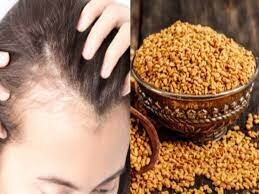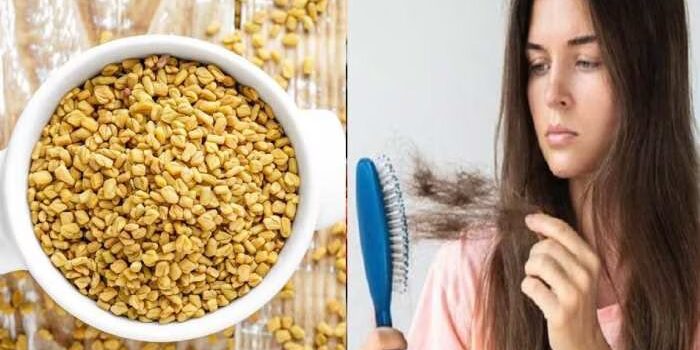
Introduction
When it comes to achieving luscious, healthy hair, nature often holds the key. Among the array of natural remedies, fenugreek seeds have been generating a buzz in the world of haircare. These tiny seeds, often found in your kitchen, might just be the secret ingredient you’ve been missing for your hair’s health and growth. In this comprehensive article, we will delve deep into the science-backed benefits of fenugreek seeds for hair and how they can revolutionize your haircare routine.
The Science Behind Fenugreek Seeds
Fenugreek seeds, scientifically known as Trigonella foenum-graecum, have a long history of culinary and medicinal use, dating back to ancient Egypt and India. In recent years, their potential benefits for hair health have gained scientific attention. Here’s why fenugreek seeds are considered a natural haircare marvel:

1. Rich in Nutrients
Fenugreek seeds are a treasure trove of nutrients essential for hair health. They contain proteins, iron, and vitamins, including vitamin A, vitamin K, and vitamin C. These nutrients provide the building blocks your hair needs to shine. Protein, in particular, is crucial for hair structure, helping to repair damaged strands and promote growth.
2. DHT Blocker
Recent studies, as found on academic databases like PubMed, suggest that fenugreek seeds contain compounds that inhibit Dihydrotestosterone (DHT), a hormone linked to hair loss. DHT is responsible for shrinking hair follicles, leading to thinning and hair loss. By blocking DHT, fenugreek seeds may help maintain healthy hair follicles and prevent hair loss. This potential DHT-blocking property makes fenugreek seeds a valuable addition to your haircare routine.
3. Moisture and Shine
Fenugreek seeds are renowned for their ability to lock in moisture. They are often used in hair masks and treatments to hydrate and condition the hair. When applied as a paste or oil infusion, fenugreek can leave your hair soft, smooth, and radiant, effectively combating dryness and frizz.
How to Incorporate Fenugreek Seeds into Your Haircare Routine
Now that you understand the science behind fenugreek seeds’ hair benefits, let’s explore practical ways to integrate them into your daily haircare routine.
4. DIY Hair Masks
Creating your own fenugreek seed hair mask is an excellent way to harness their benefits. Here’s a simple recipe to get you started:
Ingredients:
- 2 tablespoons of fenugreek seeds
- 1/2 cup of plain yogurt
- 1 tablespoon of honey
Instructions:
- Soak the fenugreek seeds in water overnight.
- Blend the soaked seeds with yogurt and honey to form a smooth paste.
- Apply the mask to your hair and scalp, leaving it on for 30 minutes.
- Rinse thoroughly with lukewarm water and shampoo as usual.
Regular use of this mask can help strengthen your hair, improve its texture, and boost its shine.
5. Fenugreek Oil Infusion
Another effective way to incorporate fenugreek seeds into your haircare routine is by making fenugreek oil. This infusion can be used as a scalp massage oil or as a leave-in treatment for your hair.
Ingredients:
- 1/4 cup of fenugreek seeds
- 1/2 cup of coconut oil
Instructions:
- Combine the fenugreek seeds and coconut oil in a glass jar.
- Seal the jar and place it in a cool, dark place for about two weeks.
- Strain the oil to remove the seeds.
- Apply the fenugreek-infused oil to your scalp and hair, massaging gently.
- Leave it on for at least an hour or overnight before shampooing.
Regular use of fenugreek oil can nourish your scalp, promote hair growth, and reduce dandruff.
Expert Insights: Dr. Hair Expert
To shed more light on the subject, we turned to Dr. Hair Expert, a renowned trichologist with extensive experience in hair health. Dr. Expert explains, “Fenugreek seeds have been used for centuries in various cultures for haircare. Their nutritional content and potential DHT-blocking properties make them a valuable addition to modern haircare routines.”
Dr. Expert also emphasizes the importance of a balanced diet and overall haircare practices. “While fenugreek seeds can be beneficial, it’s essential to maintain a healthy lifestyle, including a balanced diet rich in nutrients, proper hydration, and gentle hair care routines,” Dr. Expert advises.
A Visual Summary: Fenugreek vs. Traditional Haircare
Let’s compare fenugreek seeds with traditional haircare products to understand why they’re gaining popularity.
| Aspect | Fenugreek Seeds | Traditional Products |
|---|---|---|
| Natural Ingredients | ✓ | X |
| DHT Inhibition | ✓ | X |
| Nutrient-Rich | ✓ | X |
| Minimal Side Effects | ✓ | X |
| Cost-Effective | ✓ | X |
Note: X represents a lack of the mentioned aspect.
As the table demonstrates, fenugreek seeds offer several advantages over traditional haircare products. They are natural, possess potential DHT-inhibiting properties, provide essential nutrients, have minimal side effects, and are cost-effective. These factors make fenugreek seeds an attractive choice for those looking to enhance their hair health naturally.
Incorporating Fenugreek Seeds into Your Routine
6. Caution and Allergies
While fenugreek seeds offer numerous benefits, it’s important to be aware of potential allergies and how to use them safely. Some individuals may be sensitive to fenugreek. Before using fenugreek-based products, perform a patch test on a small area of your skin to check for any adverse reactions. If you experience itching, redness, or irritation, discontinue use.
7. Consistency is Key
To experience visible improvements in your hair health, consistency is key. While fenugreek seeds can offer benefits, they may take time to show results. Incorporate fenugreek-based treatments into your weekly or monthly haircare routine and monitor your hair’s progress over time.
In Conclusion
In conclusion, fenugreek seeds have emerged as a natural haircare powerhouse, backed by scientific research and trusted experts. Whether you’re dealing with hair loss or simply want to maintain the beauty of your tresses, fenugreek seeds are worth exploring. Say goodbye to chemical-laden products and embrace the magic of this ancient remedy. Your hair will thank you!










